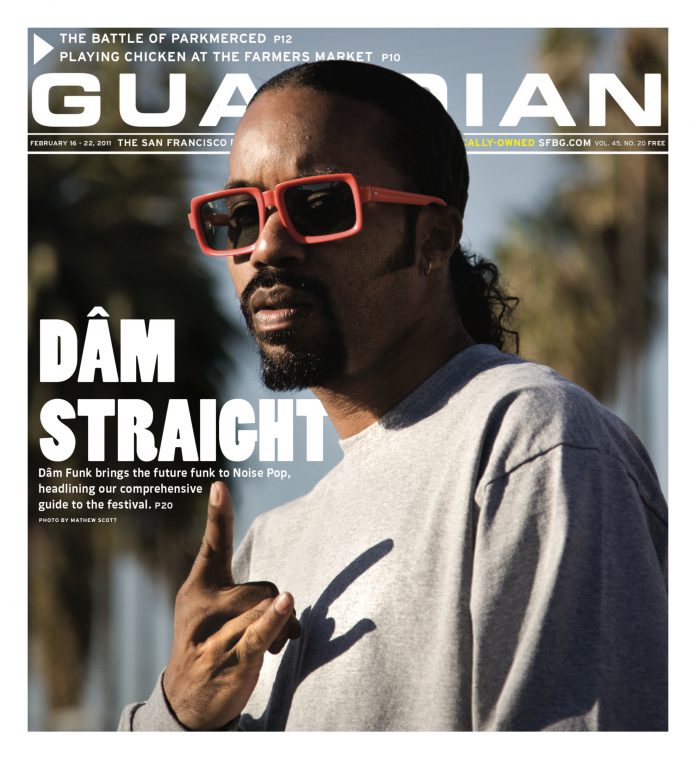arts@sfbg.com
STAGE/PUPPETRY It’s been more than 10 years since Brooklyn-based Kevin Augustine brought his life-sized puppets and existential worldview to the Bay Area, and during that time he’s not been idle. Augustine’s last full-length show, 2008’s Bride, a charged exploration of theism, garnered much critical acclaim as well as an UNIMA-USA Citation of Excellence in Puppetry — the profession’s highest honor.
Just one month after Bride‘s successful New York City run, Augustine was already nurturing the delicate sprouts of the show that has become Hobo Grunt Cycle. After briefly considering a Civil War theme, Augustine expanded his vision to encompass the broader topics of modern warfare: weapons technology, the psychological effects of war, the physical effects of violence. He began to direct his creative energies toward answering a question he felt central to the topic: What progress have we made?
“The whole idea of warfare, of training ourselves to kill other human beings, seems so archaic,” he explains over the phone.
Part of Augustine’s brainstorming process includes sketching possible characters. One of his images, a soldier in fatigues with the face of a world-weary clown, helped spark his conviction that the hierarchies between the world of the soldiers and the world of the clowns were very similar. “There are always the clowns who get hit in the face with the pie,” he points out. Drawing from the comparison between low-caste clowns getting knocked around by their “superiors” and low-ranking Dogfaces getting shafted on the battlefield by theirs, Augustine started to craft Hobo Grunt Cycle‘s narrative around a hobo clown (played by himself), while adding a parallel narrative that involves war veterans (played by puppets).
The use of tramps and clowns as protagonists is not exactly new territory for Augustine — his previous productions Big Top Machine and Once Vaudeville feature one or the other. Both can be likened to the classic archetype of the fool or trickster, which makes them perfect for illustrating uncomfortable human truths via puppetry. What’s different for Augustine as a playwright is that most of Hobo Grunt Cycle is performed in silence, a nod to the tradition of pantomiming tramp-clowns such as Emmett “Weary Willie” Kelly, as well as a symbolic comment on the blanket secrecy that shrouds many veterans of conflict during and after their tours of duty. When one soldier character is finally allowed some exposition, Augustine is representing vets such as the “Winter Soldiers,” who have been able to break this silence and speak out about their experiences.
More than just the rich, dark nuances of Augustine’s playwriting set Lone Wolf Tribe apart. The puppets themselves are incredibly distinctive. Trained in theatre and — briefly — sculpture, Augustine had no formal puppetry experience when he began working on his first puppet show in 1995.
“I started as a solo performer,” he jokes. “But it got lonely, so I added the puppets.”
Starting from scratch, without preconceived expectations of puppetry’s limits, Augustine began creating life-size puppets to his own singular specs: warped, clumsy, vulnerable bodies with grotesque features and complex emotions. The foam-rubber he carves his puppet heads from allows for an unsettling realism in terms of facial textures — sleepy half-lids, arched brows, curled lips, rutted terrains of wrinkles and lines. Most of his puppets are manipulated by whole teams of hired-gun puppeteers, who must perform heroic acrobatics as they make the puppets dance, shamble, and limp across the stage.
So does Hobo Grunt Cycle answer its central question? Augustine remains unconvinced that progress has been made.
“I believe we haven’t progressed in terms of violent conflict because we’re stuck in our adolescent stage of development,” he says ruefully. “We see things only from our point of view, and always in terms of right and wrong, mine and yours, us and them — which prevents us from seeing that all human beings [and all puppets?] have the same needs.” *
HOBO GRUNT CYCLE
Thurs./17 through March 5; $15-$25
Exit Theatre
156 Eddy, SF
(415) 673-3847

